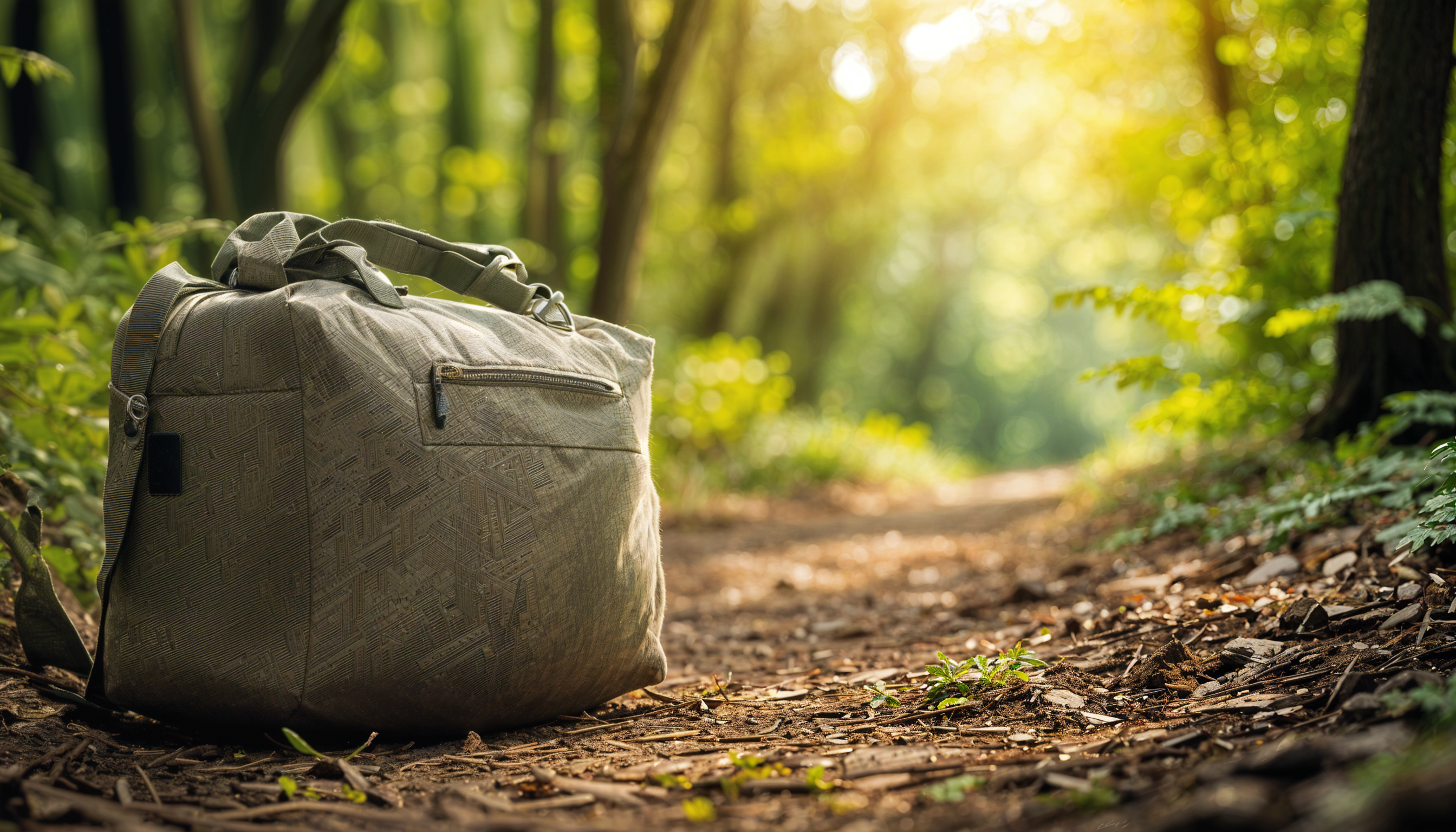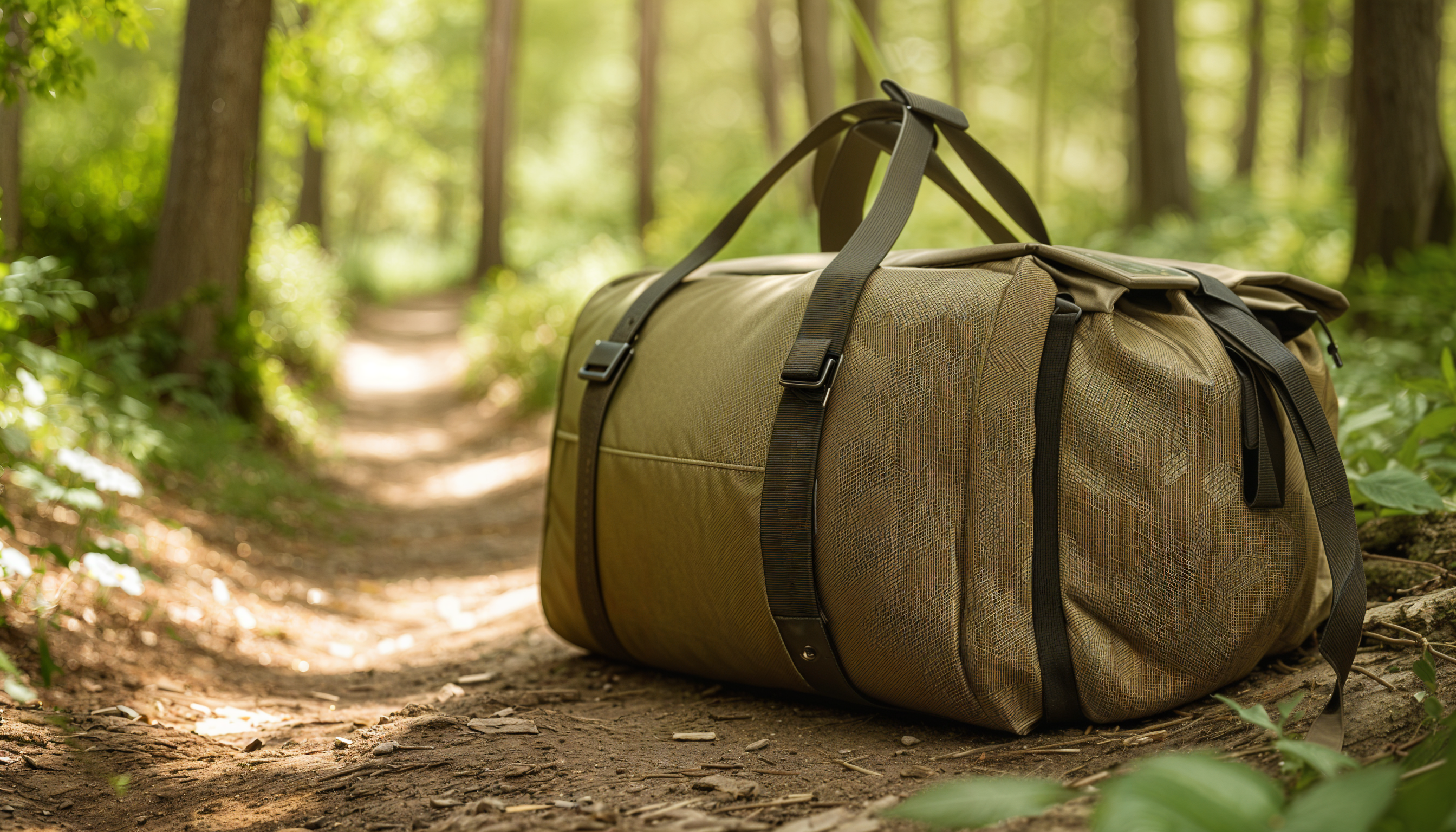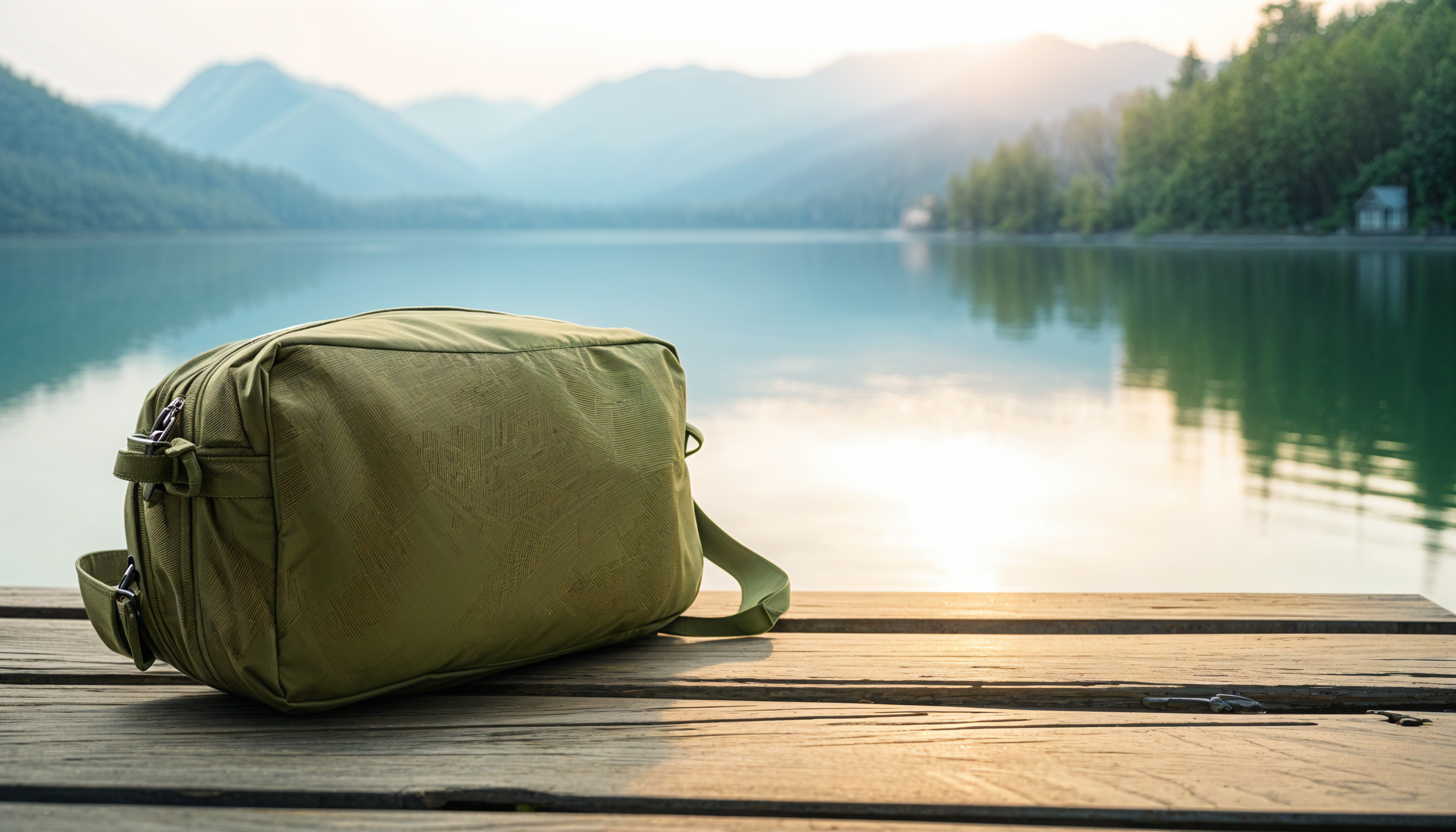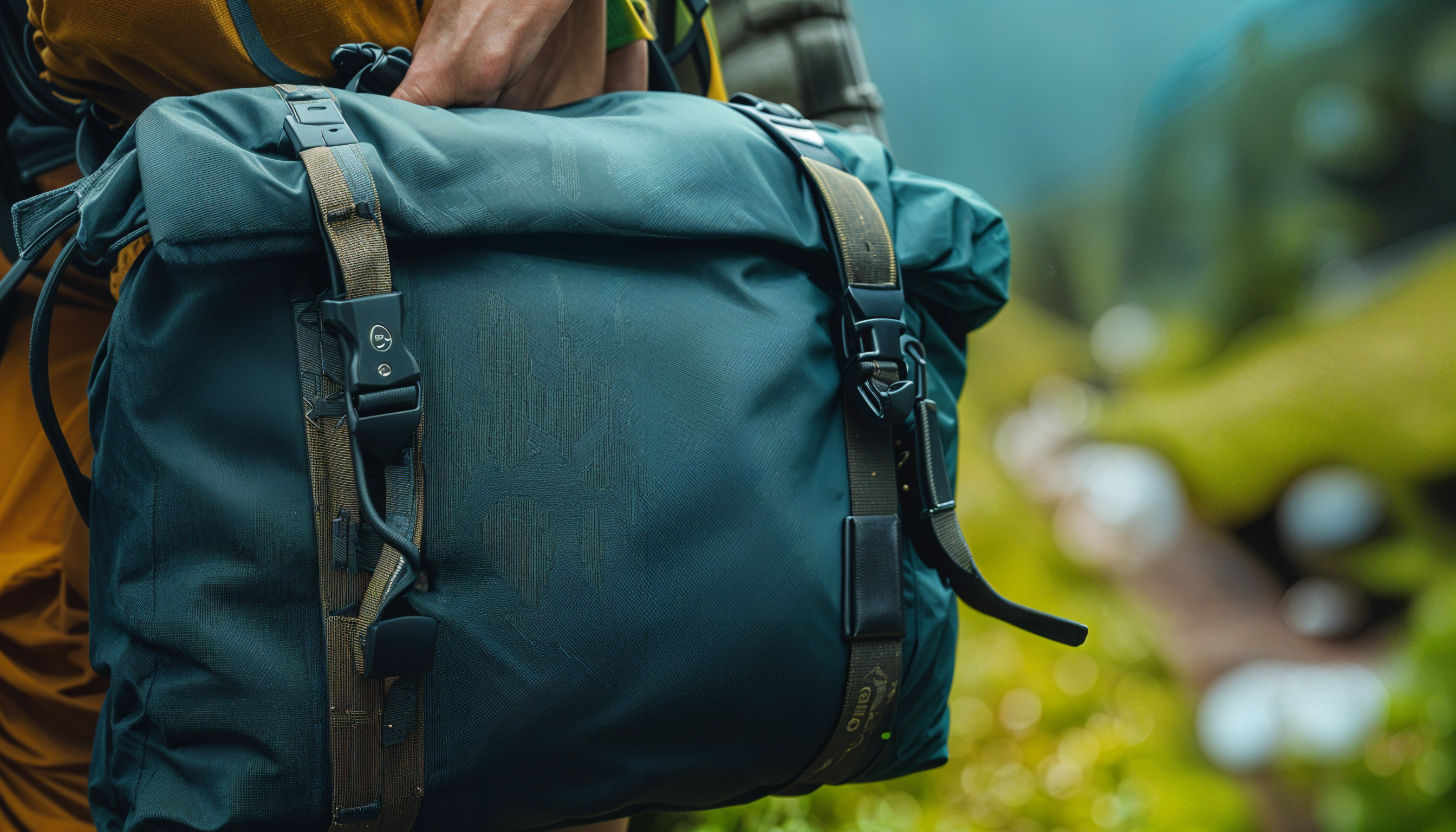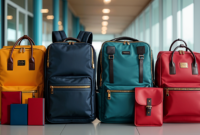As the world becomes increasingly aware of the environmental impact of our actions, the travel industry is undergoing a significant shift towards sustainability. More and more, travelers are seeking ways to minimize their carbon footprint and make responsible choices, and this includes the gear they choose to carry. Eco-friendly travel bags have emerged as a crucial element in this movement, offering a way to explore the world while minimizing harm to the planet. But what exactly are eco-friendly travel bags, and why are they so important?
Eco-friendly travel bags are designed with sustainability at their core. They are typically made from recycled or renewable materials, such as recycled plastics (like rPET from plastic bottles), organic cotton, or innovative alternatives like cork or pineapple leather. These materials help reduce waste, conserve resources, and often have a lower carbon footprint compared to traditional luggage materials. Choosing sustainable luggage is a powerful way to align your travel choices with your values and contribute to a healthier planet.
Beyond the environmental benefits, opting for eco-friendly travel bags can offer several advantages. Sustainable luggage is often designed for durability and longevity, meaning your investment will last longer and reduce the need for frequent replacements. Many brands also prioritize ethical production practices, ensuring fair wages and safe working conditions for the people involved in creating your bag. You might even find that sustainable luggage features innovative designs and functionalities that enhance your travel experience.
When selecting the perfect eco-friendly travel bag, several factors deserve consideration. The materials used are paramount, as they directly impact the bag’s environmental footprint and durability. You’ll also want to assess the bag’s functionality – does it have the features you need for your travel style, such as ample compartments, sturdy wheels, or a lightweight design? Price is naturally a consideration, but remember that investing in a high-quality, sustainable bag can save you money in the long run by reducing the need for replacements.
This article will guide you through the essential aspects of choosing the right eco-friendly travel bag for your next adventure. We’ll delve deeper into the world of sustainable materials and ethical production, explore the functionalities that cater to different travel styles, and showcase some of the leading brands in the sustainable luggage market, including names like Patagonia, Paravel, and Solgaard. We’ll also provide valuable tips on how to pack sustainably, further minimizing your impact as you explore the globe.
What to Look for in an Eco-Friendly Travel Bag: Materials and Ethical Production
When choosing an eco-friendly travel bag, the materials used are your first and most important consideration. The materials directly impact the bag’s environmental footprint, its durability, and even its style. You want a bag that aligns with your values and can withstand the rigors of travel while minimizing harm to the planet.
Sustainable Materials: Making a Difference with Every Choice
Several sustainable materials are making waves in the luggage industry. Recycled plastics (rPET), often sourced from discarded plastic bottles, are a popular choice. They help reduce plastic waste and require less energy to produce than virgin plastic. Organic cotton, grown without harmful pesticides and fertilizers, is a natural, biodegradable option that’s gentler on the environment and on cotton farmers.
Beyond these familiar options, innovative alternatives are emerging. Cork, harvested from the bark of cork oak trees without harming the tree itself, is lightweight, water-resistant, and naturally stylish. Pineapple leather, or Piñatex, is a vegan leather alternative made from pineapple leaf fibers, a byproduct of the pineapple harvest that would otherwise be discarded. These materials not only reduce waste but also offer unique textures and aesthetics.
Durability and Longevity: Investing in a Travel Companion for the Long Haul
Choosing sustainable materials often goes hand-in-hand with choosing durability. You want a travel bag that can handle being tossed around in airports, stuffed into overhead bins, and dragged through cobblestone streets. Eco-friendly bags made from recycled plastics, for example, can be surprisingly tough and water-resistant. Organic cotton canvas, when treated with natural waxes, can also be quite durable.
Investing in a well-made, sustainable bag might mean a slightly higher upfront cost, but it will save you money and reduce waste in the long run. A bag that lasts for years means you won’t need to replace it frequently, reducing your overall consumption and environmental impact.
Ethical Production: Ensuring Fair Labor and Safe Working Conditions
Sustainability isn’t just about the materials; it’s also about the people who make your bag. Look for brands that prioritize ethical and fair labor practices throughout their supply chain. This means ensuring fair wages, safe working conditions, and reasonable working hours for everyone involved in the production process.
Certifications: Your Guide to Responsible Sourcing and Manufacturing
Several certifications can help you identify brands committed to ethical and sustainable practices. Fairtrade certification ensures that producers receive fair prices for their goods and that workers are treated fairly. B Corp certification goes beyond individual products and assesses a company’s overall social and environmental performance. GOTS (Global Organic Textile Standard) certification verifies that textiles, like organic cotton, meet strict environmental and social criteria throughout the entire supply chain.
Brands Leading the Way: Examples of Sustainable and Ethical Practices
Brands like Patagonia, known for their commitment to environmental activism and responsible sourcing, offer a range of travel bags made from recycled materials. Anchal, a non-profit social enterprise, creates beautiful, handcrafted travel accessories using organic cotton and empowering artisan women in India. Solgaard utilizes recycled ocean-bound plastic in their innovative and stylish luggage designs, actively contributing to ocean cleanup efforts. These are just a few examples of brands that prioritize both sustainability and ethical production.
Functionality and Practicality: Choosing a Bag That Fits Your Travel Style
While eco-friendly materials and ethical production are essential, the functionality of your travel bag is equally crucial. After all, your bag needs to effectively carry your belongings and withstand the rigors of your journeys. Choosing a bag that aligns with your travel style and needs will make your adventures smoother and more enjoyable.
Features that Enhance Functionality:
Think about the features that would make your travel life easier. Multiple compartments can be a lifesaver for organization, allowing you to separate clothes, shoes, toiletries, and electronics. Expandable storage is a great option if you anticipate bringing back souvenirs or needing extra space on your return trip. If you’ll be navigating airports or city streets, sturdy wheels are a must-have for effortless mobility.
Lightweight and Packable Designs:
Especially if you’re a fan of carry-on luggage, a lightweight and packable design is essential. Lugging a heavy bag through airports or train stations can quickly become tiring. Look for bags made from lightweight materials and consider features like compression straps that help minimize bulk. Some bags even fold down into a compact size for easy storage when not in use.
Versatile Bag Styles for Every Adventure:
The best bag style for you depends on your travel preferences and the type of trips you typically take. Backpacks are ideal for adventurous travelers who need to be hands-free and navigate various terrains. Duffel bags offer a good balance of space and portability, perfect for weekend getaways or road trips. Rolling suitcases are a classic choice for city breaks or longer trips where you’ll be primarily on paved surfaces. Brands like Eagle Creek offer a wide range of travel bags to suit various needs.
Weatherproof Materials for Added Protection:
No one wants to arrive at their destination with soggy belongings. Look for bags made from water-resistant or weatherproof materials to protect your gear from unexpected rain or spills. Some bags even feature waterproof zippers for added peace of mind.
Practical Features for a Seamless Travel Experience:
Consider the smaller details that can make a big difference. TSA-approved locks offer added security and convenience when going through airport security. Detachable compartments or packing cubes can help you stay organized and easily access specific items. Brands like Lo & Sons and Tumi are known for incorporating thoughtful, practical features into their designs.
By carefully considering the functionality and features that best suit your travel style, you can choose an eco-friendly travel bag that not only aligns with your values but also enhances your overall travel experience.
The Best Eco-Friendly and Sustainable Luggage Brands
Ready to invest in luggage that aligns with your values? The good news is that you have a growing number of eco-conscious brands to choose from. These brands are committed to using sustainable materials, ethical production practices, and minimizing their environmental impact. Let’s explore some of the leading names in the sustainable luggage market:
Paravel: Paravel is a brand known for its stylish and sustainable luggage made from recycled materials. Their Aviator Carry-On, crafted from recycled polycarbonate, features vegan leather details, recycled zippers, and a lining made from recycled plastic bottles. Paravel offsets carbon emissions from their production and shipping processes and even offsets the average flight’s carbon footprint. They also prioritize sustainable packaging, using recycled materials and encouraging reuse.
Solgaard: Solgaard is another brand making waves with its innovative and durable luggage designs. They utilize recycled ocean-bound plastic in their suitcases and backpacks, actively contributing to ocean cleanup efforts. Their carry-ons often feature built-in organization systems, padded handles, and smooth-rolling wheels. Solgaard aims to cut ocean plastic and claims to have removed millions of plastic bottles from the ocean and rivers.
Solo New York: Solo New York offers a wide range of sustainable bags, including backpacks, laptop cases, duffel bags, and luggage, made from recycled plastic bottles. They are on a mission to recycle millions of plastic bottles from landfills. Solo also uses solar energy at their headquarters and utilizes sustainable packaging practices. They partner with the National Forest Foundation to plant trees for every bag sold from their Re:cycled Collection.
Eagle Creek: Eagle Creek is a well-established luggage brand with a strong commitment to sustainability. They incorporate recycled materials into many of their designs and have a “No Matter What” warranty, allowing you to send in damaged bags for repair or repurposing, keeping them out of landfills. Eagle Creek also prioritizes ethical manufacturing practices and community service.
Patagonia: Patagonia, renowned for its commitment to environmental activism, offers a range of durable and eco-friendly travel bags, including their popular Black Hole Duffel Collection. These bags are made from 100% recycled polyester ripstop with a weather-resistant finish. Patagonia is a Certified B Corporation and prioritizes fair trade practices throughout their supply chain.
Other Notable Brands:
- Roam: Roam allows you to customize your luggage, choosing colors and features while using recycled materials in their production.
- Lo & Sons: Lo & Sons offers a variety of stylish and functional bags made from recycled materials, organic cotton canvas, and responsibly sourced leather.
- Anchal: Anchal creates beautiful, handcrafted travel accessories using organic cotton and empowering artisan women in India.
- Samsonite: Samsonite, a major luggage brand, has introduced sustainable collections using recycled materials like Recyclex™ fabric.
- Tumi: Tumi offers a selection of suitcases made from recycled polycarbonate, a durable and lightweight material.
Comparison Table:
| Brand | Materials | Key Features | Price Range | Sustainability Initiatives |
|---|---|---|---|---|
| Paravel | Recycled polycarbonate, vegan leather, recycled zippers | Durable, lightweight, water-resistant lining, compression pad, TSA-approved lock | $$$ | Carbon offsetting, sustainable packaging, recycled materials |
| Solgaard | Recycled ocean-bound plastic, recycled aluminum, polycarbonate | Built-in organization, padded handle, smooth-rolling wheels, USB charging port | $$$ | Ocean plastic cleanup, recycled materials |
| Solo New York | Recycled PET bottles | Variety of styles, affordable prices | $$ | Recycled materials, solar energy use, sustainable packaging, tree planting |
| Eagle Creek | Recycled fabrics, Bluesign-approved materials | Durable, weather-resistant, “No Matter What” warranty | $$$ | Recycled materials, repair and repurposing program, ethical manufacturing |
| Patagonia | Recycled polyester ripstop, TPU film laminate | Durable, weather-resistant, fair trade certified | $$$ | Recycled materials, Certified B Corporation, fair trade practices |
By choosing luggage from these brands, you can travel the world with a lighter footprint and support companies that are making a positive impact on the planet.
How to Pack Sustainably and Minimize Your Impact
Choosing the right eco-friendly travel bag is a great first step, but how you pack also plays a crucial role in minimizing your environmental impact. Did you know that reducing the overall weight of your luggage contributes to lower carbon emissions during transportation? Packing lighter means less fuel is needed to transport you and your belongings, whether by plane, train, or automobile. To pack efficiently, try using packing cubes or compression bags to minimize space and weight. These handy tools can help you fit more into your bag and keep everything organized. Another way to reduce waste is by using reusable toiletry containers and travel-sized products instead of disposable ones. When selecting your clothes, opt for versatile items that can be mixed and matched to create multiple outfits, minimizing the number of items you need to bring. And don’t forget to pack eco-friendly essentials like a reusable water bottle, bamboo cutlery, and beeswax wraps to avoid single-use plastics. Finally, remember that supporting local businesses and minimizing the purchase of souvenirs with a large environmental footprint can also make a significant difference. By making conscious choices about what you pack and how you pack it, you can travel responsibly and leave a lighter footprint on the planet.
Final Thoughts: Travel Responsibly and Make a Difference
As you prepare for your next adventure, remember that the journey towards sustainable travel begins with the choices you make. When selecting your travel companion – your trusty travel bag – consider the key factors that contribute to a lighter footprint. Opt for bags crafted from sustainable materials like recycled plastics, organic cotton, or innovative alternatives like cork or pineapple leather. Prioritize durability and longevity, investing in a bag that will withstand the test of time and reduce the need for frequent replacements. Look beyond the materials and consider the ethical production practices of the brands you support, ensuring fair labor and safe working conditions for everyone involved in creating your bag.
By making informed purchasing decisions and choosing brands that align with your values, you can make a real difference. Your choice of sustainable travel gear not only reduces your impact on the environment but also supports companies committed to responsible practices and empowers local communities. Remember that every small step counts. Explore online resources and certifications like Fairtrade, B Corp, or GOTS to delve deeper into the world of sustainable travel products. Ultimately, responsible travel is about making conscious choices that minimize harm and preserve our planet for future generations. Let your eco-friendly travel bag be a symbol of your commitment to exploring the world responsibly and leaving a positive impact wherever you go. Your adventures can be a force for good, ensuring that the beauty and wonder of our planet are enjoyed for years to come.

